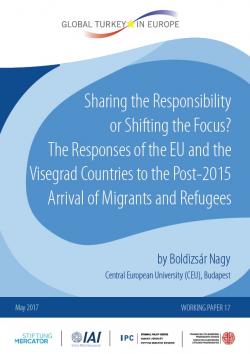Sharing the Responsibility or Shifting the Focus? The Responses of the EU and the Visegrad Countries to the Post-2015 Arrival of Migrants and Refugees
The key research question of this paper is why the Visegrad group countries (the Czech Republic, Hungary, Poland and Slovakia) are reluctant to participate in the EU schemes on solidarity with third states and within the EU. The notions of solidarity, burden- and responsibility-sharing are clarified (together with related concepts, such as loyal cooperation) before reviewing in a systemic way the possible range of responsibility-sharing in regard to asylum seekers and persons in need of international protection. Scholarly and institutional proposals for burden-/ responsibility-sharing are presented as an arsenal of options available to the Visegrad Group and the EU in general. An analysis of the Visegrad countries documents and actual situation with regard to the irregular movement proves that whereas they uniformly reject the idea of compulsory relocation within the EU of persons applying for international protection, in general the group is far from homogenous. Hungary and Poland significantly differ from the Czech Republic and Slovakia. Even within the group, Hungary may have acquired a specific position with its total denial of the fact that irregularly arriving persons may need protection within the EU. The conclusion is that more responsibility-sharing within the EU as a whole would be needed, leading to a unified protection space, but in reality a shift of the focus emerges, with the effort to move protection into geographic areas outside the EU.
Revised and updated version of a paper presented at the seminar “The Refugee Debate in Central and Eastern Europe: Can the EU-Turkey Deal Survive Without Intra EU Convergence on Relocation and Resettlement?”, Budapest, 24 February 2017.
-
Details
Roma, IAI, May 2017, 20 p. -
Issue
Working Papers 17
Introduction
1. Solidarity, fair sharing of responsibility, allocation of responsibilities
2. Scholarly views and legal measures of burden-/ responsibility-sharing in receiving refugees
3. EU schemes for relocation and resettlement of asylum-seekers and their implementation
4. The Visegrad countries’ response to the EU measures
5. The different roles played by the Visegrad countries in EU-bound migration
6. The lack of unity in the V4
7. Short digression: Hungary’s extreme policies
Conclusion
References



